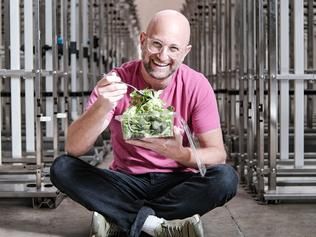Plastic, no thanks
Customers prefer food packaging that they consider sustainable
Consumers are willing to pay more money for food packaging that they themselves perceive as sustainable. According to a new study by Martin Luther University Halle-Wittenberg (MLU), unpackaged foods are even the most popular for fruit and vegetables, followed by paper packaging and those made from recycled plastic. Conventional plastic and so-called bioplastics, on the other hand, fare poorly. The evaluation of the non-representative study included information from around 260 people. It was recently published in the journal "Resources, Conservation and Recycling".

Photo by Conor Brown on Unsplash
Previous studies on the acceptance of different packaging materials often focused on a few packaging alternatives. For example, respondents could only choose between conventional and bioplastic. The latter is a group of plastics that are biodegradable and/or made from renewable resources. "A broader variety of options, including unpackaged products, for example, has been given too little consideration in research to date," says economist Sebastian Rhein. In the new study, respondents were therefore able to choose between different product alternatives with different packaging, which also differed in price, in a similar way to shopping in a supermarket. In addition, they were asked to rank packaging materials according to their sustainability and to provide information on their knowledge of individual packaging materials as well as their wishes regarding product packaging in their daily shopping.
According to the survey, unpackaged food was particularly popular, but recycled plastic and paper packaging were also preferred over conventional plastic. "The consumers we surveyed were quite willing to spend more money on alternatives to conventional plastic packaging if they perceived them to be more sustainable. Even if they received less in return, as it were, as in the case of unpackaged food," says Dr. Katharina Sträter. It also became apparent that the perception of the respondents does not necessarily correspond to current scientific findings on the subject. The main problem here is that there is as yet no general consensus on which packaging material is actually sustainable. Here, the researchers see science and politics as having a responsibility to create clarity.
Bioplastics fared particularly poorly in the survey, although earlier studies had shown the opposite. Respondents said they knew too little about the material and its properties. "Our results indicate that behind the term bioplastic, people tend to assume a product that is just as bad for the environment as conventional plastic," said co-author Christoph Herrmann.
According to the team, the findings also provide important starting points for retailers: "Until now, many companies assumed that their clientele would not be willing to pay more money for more sustainable packaging. For the time being, we cannot confirm this. Rather, we see: Dissatisfaction with plastic packaging is enormous, and there is great potential in this," concludes Rhein.
The study by the Halle team provides many indications, but is not representative for Germany. Whether the results can be generalized for the entire population would have to be examined in further studies.
Note: This article has been translated using a computer system without human intervention. LUMITOS offers these automatic translations to present a wider range of current news. Since this article has been translated with automatic translation, it is possible that it contains errors in vocabulary, syntax or grammar. The original article in German can be found here.
Original publication
Other news from the department science

Get the food & beverage industry in your inbox
By submitting this form you agree that LUMITOS AG will send you the newsletter(s) selected above by email. Your data will not be passed on to third parties. Your data will be stored and processed in accordance with our data protection regulations. LUMITOS may contact you by email for the purpose of advertising or market and opinion surveys. You can revoke your consent at any time without giving reasons to LUMITOS AG, Ernst-Augustin-Str. 2, 12489 Berlin, Germany or by e-mail at revoke@lumitos.com with effect for the future. In addition, each email contains a link to unsubscribe from the corresponding newsletter.
























































